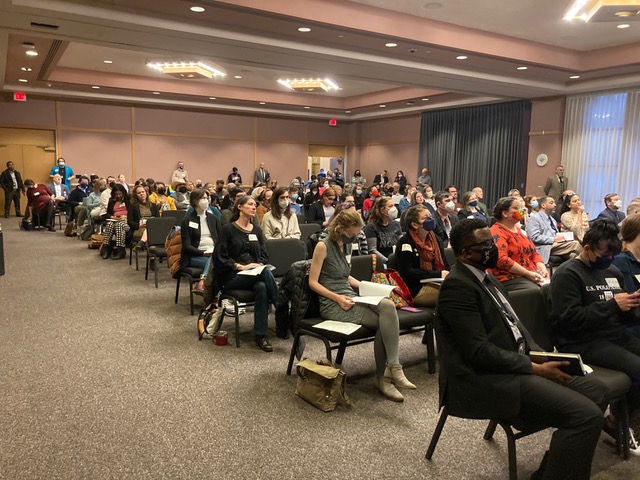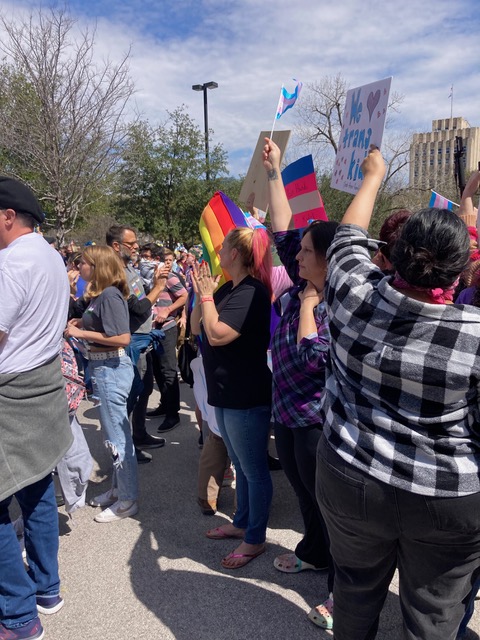by Erika Slaymaker
After more than a year of endless attacks, trans and queer people in Texas are still fighting back.
The Texas legislature has been a battleground over transgender, intersex, and nonbinary young people’s access to school sports, healthcare, and parental support. Equality Texas, one of the leading statewide LGBTQ organizations, counted 76 anti-LGBTQ bills filed in Texas in 2021, with a majority specifically relating to transgender people. Out of all these bills, Republican efforts focused on restricting transgender young people’s access to athletics in K-12 public schools. LGBTQ activists resisted, but Republican legislators prevailed in passing legislation that further enshrined the gender binary into law in Texas. Texas is one of fourteen states that has enacted similar laws across the country (Movement Advancement Project 2022). Rather than an outlier, the case of Texas is emblematic for understanding the larger recent wave of anti-transgender legislation.

Then, on February 22, 2022, Attorney General Ken Paxton issued a non-binding legal opinion that trans affirmative medical care for young people should legally be understood as child abuse in the state of Texas. In coordination with this opinion, Governor Abbott ordered the Department of Family and Protective Services (DFPS) to investigate families and institutions that provide transgender children with affirmative medical care. This is an escalation of the anti-trans attacks that were waged in Texas in 2021. While legislators discussed expanding the legal definition of child abuse to include supporting transgender children’s access to medical care last year, this was seen as too extreme by many Texas elected officials then. Now, though, these shifts have become state policy.

In response, LGBTQ advocates have mobilized large rallies, lobbied state officials, and testified at hearings. On March 11, more than 80 advocates testified at the Department of Family and Protective Services (DFPS) council meeting. Parents, trans adults and young people, and other advocates spoke out against DFPS child abuse investigations of families with transgender or non-binary children. Parents and children are concerned about the consequences of speaking publicly, so to protect the identities of families, advocates read anonymous testimonies on behalf of those who were not comfortable speaking at the public meeting. Again and again, advocates repeated that they were speaking on behalf of “parents of transgender children, many of whom are terrified to be here today.” At the next DFPS council meeting, on June 10, advocates came together again to share testimony from transgender children and their loved ones.
This organizing is happening at the same time as Lambda Legal and the ACLU of Texas, among other organizations, are bringing legal cases against the state of Texas. After a temporary injunction on Abbott’s order, DFPS was prohibited from pursuing investigations of families. The Texas Supreme Court, though, partially overturned this injunction, allowing some investigations to continue. According to the All in for Equality Coalition, “While the court’s ruling narrows the scope of the injunction, it unequivocally states that the Governor was acting beyond the scope of his authority”. The Texas Supreme Court, while it overturned parts of the previous injunction, did say that DFPS acted out of bounds, or at least did not legally have to follow the Governor and Attorney General’s opinions.
While the court cases continue to unfold, queer and trans people draw on collective resilience to chart a path forward. Anti-trans attacks are part of the right’s broader racist and sexist agenda. As right-wing politicians use anti-trans policies to propel a dark and limiting vision of society, trans and queer people are showing the way towards a vision of society where all people can live full, complicated, joyful lives.

Erika Slaymaker is a PhD Candidate in Sociology at the University of Texas. Her dissertation research investigates anti-trans legislation and policies in Texas.
